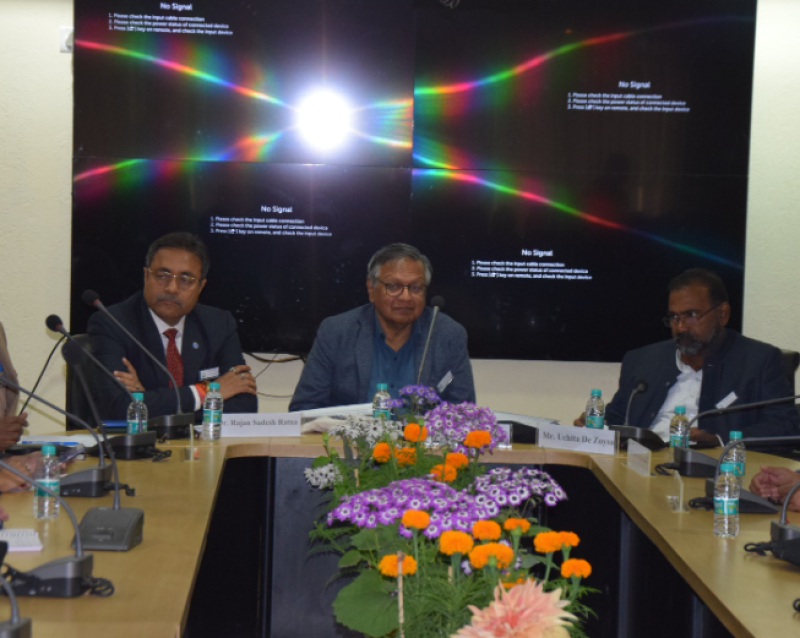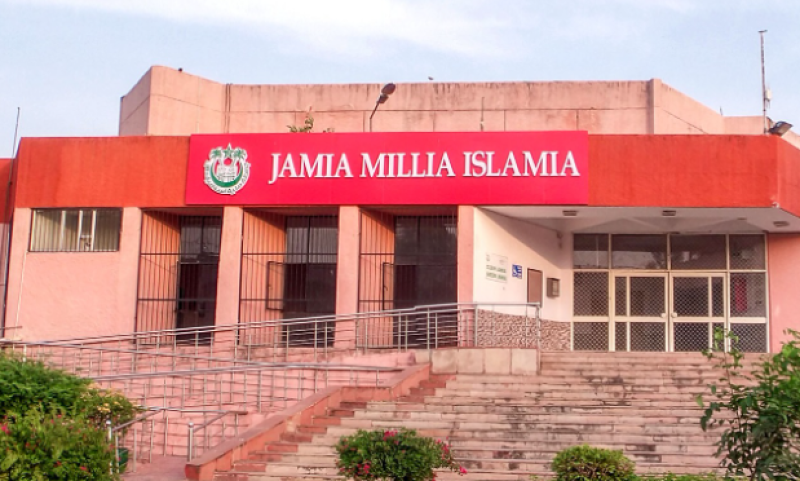New Delhi, March 14: The Department of Economics, Jamia Millia Islamia (JMI) organised the Global Conclave on Sustainable Development Goals: Progress, Challenges and Way Forward during 6-7th March 2024. The conclave started off with welcome remarks by Prof. Asheref Illiyan, Head Department of Economics, JMI and Conference Director. Prof. Partha Sen, Former Director, Delhi School of Economics delivered the Presidential address.
Prof. Sen emphasized over the conflicting objectives of the government, i.e., on the one hand Governments wish to achieve Sustainable Development Goals (SDGs) and on the other hand Governments also need to achieve fiscal and monetary balance. While realization of SDGs includes achieving a certain minimum level of stock variables such as public health, Nutrition , education, etc. which plays a crucial role in sustained growth of the economy. However, the need for achieving fiscal and monetary balance in every consecutive period forces the government to curtail spending and credits. While the Global North has largely solved the problem of its stock variables and is exclusively concerned about managing macro balance of flow variables, the global south continues to grapple with improving their stock variables broadly captured by human development indicators.
Dr. Rajan Sudesh Ratna, Deputy Head and Senior Economic Affairs Officer, United Nations Economic and Social Commission for Asia and the Pacific (UN-ESCAP), South and South West Asia Office, in his inaugural speech, appreciated that SDGs are relevant to and responsibility of every individual and organisation in the world. He iterated that we are far off from achieving targets for 89% of the indicators in the region as per UN-ESCAP report. While identifying the challenges countries face in achievement of SDGs, he emphasize the role of the researchers in helping governments to make evidence-based policy interventions.
Mr. Uchita De Zoysa, Chairman, Global Sustainability Solutions (GLOSS), Executive Director, Centre for Environment & Development (CED), Colombo, Sri Lanka, said that notwithstanding the slow and dissatisfactory progress, fundamental idea behind SDGs is to transform the world in terms of thinking around the global challenges and not merely to achieve targets by countries.
After the inaugural session, Ist Plenary session began with highly reputed speakers such as Prof. Achin Chakraborty, Former Director, Institute of Development Studies Kolkata, Prof. Santosh Mehrotra, Former Chairperson, Centre for Informal Sector and Labour Studies, JNU, New Delhi and Visiting Professor, Centre for Development Economics, University of Bath, UK, Prof. Kavita Rao, Director, National Institute of Public Finance and Policy (NIPFP) and Dr. Tauhidur Rahman, Founding Director, Initiative for Agency and Development (IFAD) and Associate Professor, Department of Agricultural and Resource Economics, University of Arizona, United States of America (USA). Prof. Achin laid emphasis on utilising latest advances in professional economic theory to analyse issues that are highly relevant for SDG related target indicators. Prof. Santosh Mehrotra weaved coherent story arguing that if human development precedes economic growth then we are more likely to achieve SDGs goals on poverty and inequality. Prof. Kavita Rao underscored the difficulty in achieving a uniform definition and measurement of spending that are relevant to SDGs. Dr. Tauhidur Rahman tried to rationalise gender dimensions in achievement of SDGs. He argued that India has been lacking in progress on Female Labour force participation primarily because we have not been able to address the gender norms that hinder the autonomy and agency of women.
Prof. Praveen Jha, JNU chaired the second Plenary session of the conclave. Prof. Arun Kumar, Former Professor, JNU, Prof. Joyashree Roy, Director-SMARTS Center, Asian Institute of Technology (AIT), Thailand. Prof. Srijit Mishra, Indira Gandhi Institute of Development Research (IGIDR), were speakers in the session. The focus of the session was on climate change and health related issues in sustainability. Prof. Arun Kumar hinted towards the current state of the global political economy that acts as a formidable impediment to sustainable development. In similar mode, Prof. Srijit Mishra using evidence from his recent publication in Current Science global reaction to COVID asserted that response to global poly crises such as COVID should have solid evidence base and be proportional to the crisis.
Prof. Joyashree’s presentation tried to examine the workability for manual workers given the ambient temperature and humidity in metro cities of India. She found that more than 90% of days in any given year remain under non-workable zone until extreme solutions such as Air conditioning.
The third Plenary session of the conclave was again packed with highly reputed scholars of our time. Prof. S Mahendra Dev, currently Editor of Economic and Political Weekly (EPW) and Former Director and Vice Chancellor, Indira Gandhi and Institute of Development Research chaired the session. Prof. Nanak Kakwani, Former Head, Department of Economics, University of South Wales, Australia, Prof. Gaurav Datt, Monash University and Prof. Amitabh Kundu, former Dean, School of Social Sciences, JNU were speakers in the session. Prof. Kakwani pointed out that although there are 169 target Indicators for SDGs we have limited data to track all of them for all countries. It is useful to have summary measures which can assess how a society is doing overall.
He proposed four measures namely inclusive growth, inclusive development, pro-poor growth and pro-poor development. Prof. Amitabh Kundu argued that at a given point of time, poverty should be assessed using consumption as well as multidimensional poverty. Exclusively relying on any one may lead to blind spots making it hard for policy makers to address the different dimensions of poverty. Prof. Gaurav Datt traced the evolution of poverty since the early 70s. He identified that poverty decline accelerated during the 1990s. He also highlighted many data gaps in measurement of consumption.
In addition to the three plenary sessions the Conclave included 14 technical sessions with an average of 5 papers in each session totalling more than 70 papers. The recurring themes in papers presented were challenges of local environment and global climate change, challenges in creation of decent employment, poverty and nutrition and health issues faced by specific population groups.
In the valedictory function Dr Zakaria Siddiqui, Associate Professor & Conference Convenor, Department of Economics, JMI, presented a brief version of rapporteurs report after which Prof. Ravi Srivastava, Former Professor, CSRD, JNU, delivered the valedictory address. He highlighted the importance of deliberations during the two days of conference, particularly focusing on the use of professional economics in assessing progress of SDGs. Prof. Abdul Shaban Chairperson, CPPHHD, TISS, Mumbai graced the occasion and reverberated the major moments of the Conclave. He particularly emphasized on data and measurement related issues in assessing the progress in SDGs.
Mr. Daya Sagar Shrestha, Executive Director, National Campaign for Sustainable Development congratulated the Department of Economics in taking enough effort to ensure participation of diverse set of stakeholders in the conference. He also highlighted the fact that exchange between civil society and academic institutions can foster a virtuous cycle of knowledge growth. The event was systematically coordinated by Dr. Mohammad Kashif Khan, Assistant Professor, Department of Economics, JMI. The Conclave ended with voted of Thanks delivered by Dr Vasim Akram, Assistant Professor, Department of Economics, JMI.


